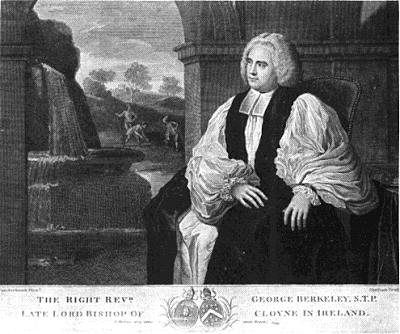Philosophy
 The empiricist philosopher John Locke worked out some of the details of an important distinction (originally formulated by Descartes) between primary and secondary qualities, and he was quite pleased with himself as this distinction allowed for the possibility of doing some serious science: you can't study secondary qualities objectively, since they are essentially subjective (and thus liable to change from person to person), but you can study primary qualities scientifically, since there is no difference in those cases between what you experience and what is.
The empiricist philosopher John Locke worked out some of the details of an important distinction (originally formulated by Descartes) between primary and secondary qualities, and he was quite pleased with himself as this distinction allowed for the possibility of doing some serious science: you can't study secondary qualities objectively, since they are essentially subjective (and thus liable to change from person to person), but you can study primary qualities scientifically, since there is no difference in those cases between what you experience and what is.
As you can learn in the following hilarious little presentation, little did Locke imagine that soon after, a) Bishop Berkeley would take this distinction to its logical conclusion and show that there is no real difference between primary and secondary qualities, and that b) the physical world would disappear as a result...
Esse est percipi... Dang!
- Knock-knock Jokes And Limericks
My Fellow Comedists, More theology this weekend. I'm considering why knock-knock jokes are not funny, but limericks are. Good brother Rob, many years ago, worked on a paper with me about knock-knock jokes and whether Raskin and Attardo's script...
- No, Not Mostly Bollcks
Manolis asks, "I just want a philosopher's opinion: are cultural studies, film studies, critical theory, social theory and whole bunch of English departments all mostly bollocks? I have the sneaking suspicion that those fields love a theory, especially...
- What Is The Difference Between Hip And Cool?
An interesting conversation today that tried to distinguish between being hip and being cool. One could be utterly unhip, but a very cool person. To be hip, it was argued, requires being hip to something, it means being on the cutting edge, being more...
- John Locke
(1632-1704) One of the common things among Descartes, Spinoza and Leibniz is that they are all rationalists. Rationalism is the system of thought, which believes in reason as a primary source of knowledge. A rationalist may also believe that man has certain...
- George Berkeley
(1685-1753) ?All the choir of heaven and furniture of earth - in a word, all those bodies which compose the frame of the world - have not any subsistence without a mind,? was the view of George Berkeley, an Irish bishop and philosopher. He was an empiricist...
Philosophy
John Locke & Bishop Berkeley animation
 The empiricist philosopher John Locke worked out some of the details of an important distinction (originally formulated by Descartes) between primary and secondary qualities, and he was quite pleased with himself as this distinction allowed for the possibility of doing some serious science: you can't study secondary qualities objectively, since they are essentially subjective (and thus liable to change from person to person), but you can study primary qualities scientifically, since there is no difference in those cases between what you experience and what is.
The empiricist philosopher John Locke worked out some of the details of an important distinction (originally formulated by Descartes) between primary and secondary qualities, and he was quite pleased with himself as this distinction allowed for the possibility of doing some serious science: you can't study secondary qualities objectively, since they are essentially subjective (and thus liable to change from person to person), but you can study primary qualities scientifically, since there is no difference in those cases between what you experience and what is.As you can learn in the following hilarious little presentation, little did Locke imagine that soon after, a) Bishop Berkeley would take this distinction to its logical conclusion and show that there is no real difference between primary and secondary qualities, and that b) the physical world would disappear as a result...
Esse est percipi... Dang!
- Knock-knock Jokes And Limericks
My Fellow Comedists, More theology this weekend. I'm considering why knock-knock jokes are not funny, but limericks are. Good brother Rob, many years ago, worked on a paper with me about knock-knock jokes and whether Raskin and Attardo's script...
- No, Not Mostly Bollcks
Manolis asks, "I just want a philosopher's opinion: are cultural studies, film studies, critical theory, social theory and whole bunch of English departments all mostly bollocks? I have the sneaking suspicion that those fields love a theory, especially...
- What Is The Difference Between Hip And Cool?
An interesting conversation today that tried to distinguish between being hip and being cool. One could be utterly unhip, but a very cool person. To be hip, it was argued, requires being hip to something, it means being on the cutting edge, being more...
- John Locke
(1632-1704) One of the common things among Descartes, Spinoza and Leibniz is that they are all rationalists. Rationalism is the system of thought, which believes in reason as a primary source of knowledge. A rationalist may also believe that man has certain...
- George Berkeley
(1685-1753) ?All the choir of heaven and furniture of earth - in a word, all those bodies which compose the frame of the world - have not any subsistence without a mind,? was the view of George Berkeley, an Irish bishop and philosopher. He was an empiricist...
